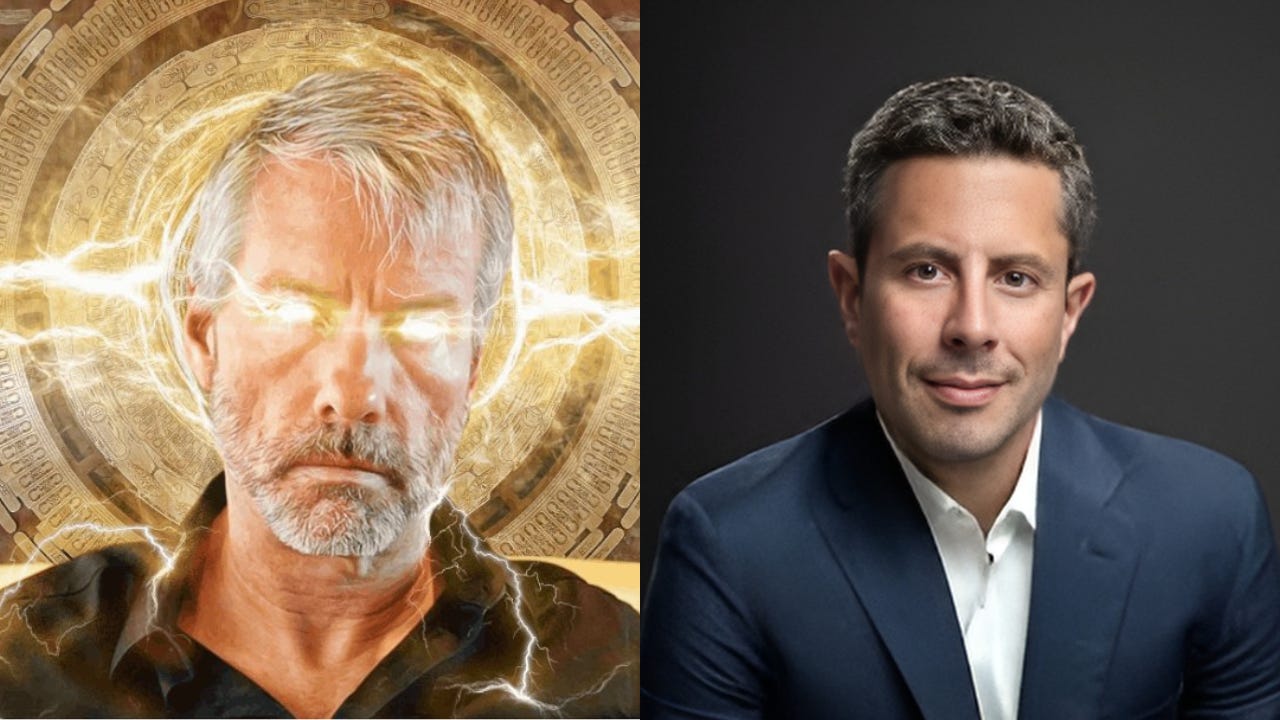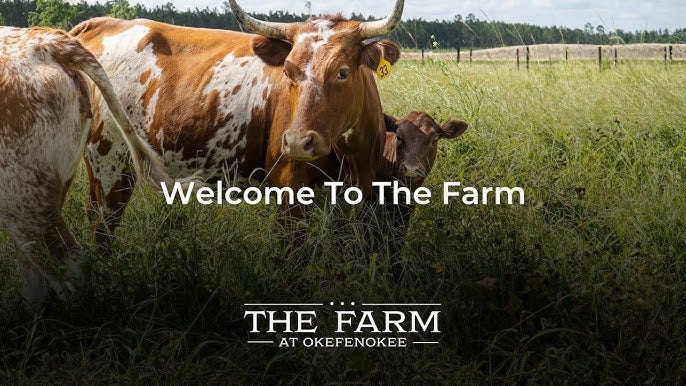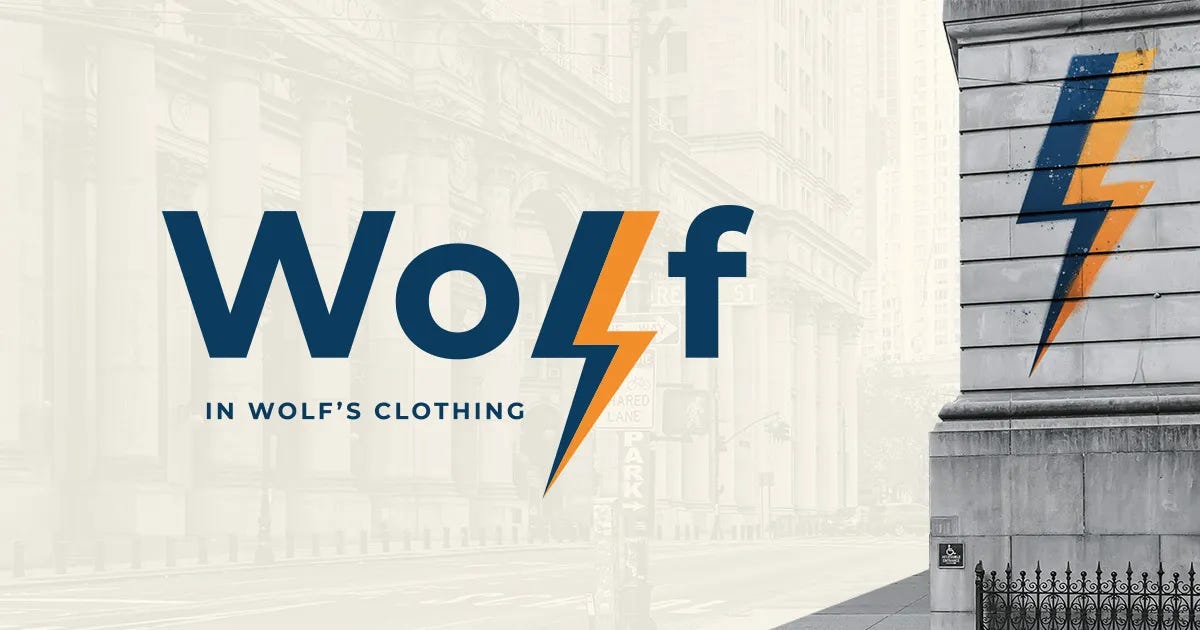Bitcoin Yield: Saylor and Saifedean - WiM Weekly
A weekly rundown of new WiM podcast releases and some food for thought
Michael Saylor’s recent appearance on “The Bitcoin Standard Podcast” with Saifedean Ammous has ignited debate on a hotly contested topic: earning yield on Bitcoin. Let’s explore the arguments for both sides:
Saylor’s Vision: Digital Banks and Bitcoin Yield
Saylor frames Bitcoin through the lens of traditional capital and financial markets. Bitcoin, being digital capital, should function like other capital assets that generate returns.
In Saylor’s vision, the future involves a new class of digital banks that are far more conservative and reliable than the "crypto cowboys" of the past like Celsius, FTX, and BlockFi.
“What we really could use is the formation of a set of digital banks that use digital capital. Of course the first generation of them, we can name them right? Celsius, FTX, BlockFi … they were kind of like crypto cowboys. They weren’t very trustworthy and they took insane risk and they blew up. We don’t want that. We need a bunch of banks with adult supervision, credit controls, and risk controls that think really hard about this and manage more carefully.” — Michael Saylor
Saylor argues that a world in which Bitcoin is valued at trillions of dollars would necessitate a robust financial system that includes banks, credit, and lending:
You're going to have to actually have a functioning banking system that will actually loan out the capital. Capitalism requires capital, banks require lenders and borrowers. The basics of Austrian economics is that some dude has more money than he needs and somebody else needs the money in order to build a factory. That's why you have a banking system and you have lending. So my point is, lending is not bad, Banks are not bad, lending Bitcoin is not bad. Ultimately, if you imagine a world where there's hundreds of trillions of dollars in Bitcoin we need a functioning banking system to move the capital around. — Michael Saylor
For Saylor, Bitcoin holders should be able to get a yield on their capital without selling the underlying asset. He envisions a system where the largest banks in the world, backed by governments, allow hodlers to earn yield, while avoiding the need to ever sell their Bitcoin. This would, in Saylor’s view, align Bitcoin with the broader history of sound money:
"I think capital has value, and I think Bitcoin is digital capital … If you have capital, then I think you'll be able to loan it to someone or rent it to someone, and they're going to pay you for it in the way that people did make capital available in the past. The history of humanity is full of examples of banks that made loans of sound money and got paid, and people that paid interest on it. You're basically taking this position that somehow interest rates go to zero forever because of something, and I don't get that. If Bitcoin is digital gold in the future, then you should be able to loan it to someone and get paid interest on it in the same way that we loaned gold in the past to people and got paid interest on it. We can debate over what the number should be, but the debate is, certainly, I'm not going to give you the Bitcoin for free. I'm going to expect to get paid for it, and if someone's going to pay for the capital, then there is a business model there, and it's worthwhile to consider the implications of that when Bitcoin is worth a hundred trillion dollars." — Michael Saylor
Saifedean’s Skepticism: Yield Without a Lender of Last Resort?
Saifedean Ammous presents a more skeptical view of earning yield on Bitcoin. For Saifedean, Bitcoin’s fixed supply and lack of a “lender of last resort” creates a fundamentally different economic model, one that is not compatible with the idea of a “risk free rate.”
“I'm generally a little skeptical of the idea that we're going to have Bitcoin yields. I think we're just going to see a lot more Celsius’ and a lot more BlockFi’s because ultimately I don't think this model works without a lender of last resort… I think people are just going to learn the hard way to not do this. I don't see it surviving.” — Saifedean Ammous
Saifedean’s central argument is that Bitcoin’s lack of a "lender of last resort" — a role traditionally played by central banks in the fiat system — makes it difficult to imagine a stable, low-risk, yield-generating system. Without the ability to print money, as fiat institutions like JP Morgan and Citi do, Bitcoin banks would not have the same ability to backstop their loans in times of crisis.
“In a world where the money supply is fixed and there’s no lender of last resort; in a world where JP Morgan doesn’t have a magic money printer, because JP Morgan prints money, not just the U.S. government and the Federal Reserve. In that kind of fiat privilege system, they are able to offer you 5% because they are printing that money. They create the billion dollars they lend you out of thin air, and then they earn money from the interest on other people’s billions of dollars that they also made out of thin air. That game stops with Bitcoin—there’s no lender of last resort.” — Saifedean Ammous
The ability to create money out of thin air and use that to offer “risk-free returns” does not exist in the Bitcoin system. Saifedean argues that any attempt to create yield from Bitcoin will ultimately involve risk. Each market participant will ultimately need to determine their own risk tolerance.
Saifedean instead envisions a world where Bitcoiners don’t rely on yield, but on their ability to accumulate more Bitcoin and other performing assets. The primary function of Bitcoin is as money: a hedge against the uncertainty of the future. Following Saylor commenting:
“The point is, if you don't borrow against it and you generate no yield on it then you're just holding it as a reserve which you expect to sell at some point in the future in order to pay an unforeseen expense.”
Saifedean replied:
“That's what money is. That's the definition of money. It's only because of uncertainty that we hold money; if it wasn't for uncertainty, we'd hold performing assets.”
I commend Saylor and Saifedean for their willingness to engage in respectful disagreement and improve the discourse on this topic to the benefit of all Bitcoiners. For whatever it’s worth, I think the truth falls somewhere in the middle: given the incentive to save in sound money since it is generally expected to appreciate as an economy becomes more advanced, I expect to see much greater savings rates and much less debt accumulation on a Bitcoin standard. I also think the natural interest rate, as a quantitative appraisal of the general time preference of market actors, should continually approach zero as time preferences decline, thus reducing the incentive to lend Bitcoin. So while banks will likely still exist on a Bitcoin standard, they will look much different than they do today, and their business models will likely be centered on Bitcoin custody and maturity matching for commercial lenders and borrowers that do engage in the lending and borrowing of Bitcoin.
This Week:
WiM514 with Jack Weatherford
“Genghis Khan was vicious in warfare, but he was quite fair in that he gave people an opportunity [to surrender] and he stuck to his word … In warfare there was one goal only: victory. And he never lost a war. It’s not so much that he was so strong that he could win any battle, he know he should never fight a battle unless he knew he could win.” – Jack Weatherford
Link to full episode: Genghis Khan and the Making of the Modern World with Jack Weatherford (WIM514)
WiM515 with Pat Antuzzi
“When you go to The Farm [at Okefenokee] and take in that environment, you’re stepping back in time to something simpler. There’s something special about that connection [to nature]. Watching the sunrise is huge. Get outside, take your shoes off, and watch the sunrise. All the sudden, you’ll find yourself a little more connected.” — Pat Antuzzi
The full episode with the Pat Antuzzi will go live today (9/20/24) at 3:00pm EST.
We’ve relaunched the Clips Channel! Subscribe for highlights from episodes and other exclusive content:
We’ve launched a WiM Telegram Community Channel! Join us here to engage with a group of deep thinkers, freedom maximalists, and Bitcoiners:
Next Week:
9/24 with Ian Carroll
Ian Carroll is an investigative journalist and popular social commentator with millions of followers across his social media accounts.
9/27 with Robert Breedlove (Conversations with Adrian Podcast)
I join personal growth coach Adrian D’Amico on his show the “Conversations with Adrian Podcast.”
Sponsors:
The Farm at Okefenokee (mention BREEDLOVE for $21,000 off a custom cabin): https://okefarm.com/
Heart and Soil Supplements (discount code BREEDLOVE): https://heartandsoil.co/
In Wolf's Clothing: https://wolfnyc.com/
Tuttle Twins - Teaching Kids Critical Thinking: http://angel.com/breedlove
Mind Lab Pro: https://www.mindlabpro.com/breedlove
Products I Endorse:
EFANI: Protect your mobile phone from SIM swap attacks: https://www.efani.com/breedlove
Noble Protein (discount code BREEDLOVE for 15% off): https://nobleorigins.com/
The Bitcoin Advisor: https://content.thebitcoinadviser.com/breedlove
Lineage Provisions (use discount code BREEDLOVE): https://lineageprovisions.com/?ref=breedlove_22
Colorado Craft Beef (use discount code BREEDLOVE): https://coloradocraftbeef.com/








